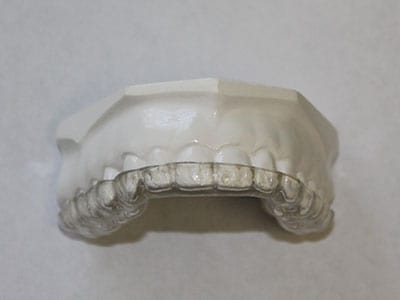TMJ Treatment and Night Guard
Bruxism or teeth grinding is common. Due to grinding teeth, the enamel of teeth wear off, and overtime dentin will expose. Sometimes micro-cracks will appear after prolonged grinding teeth. These may cause teeth sensitivity.
TMJ or temporomandibular joint is the connection between the lower jaw to the skull.
Temporomandibular disorder(TMD) is a disorder that affects or is affected by deformity, misalignment, or dysfunction of the temporomandibular articulation. The occlusal deflection of the temporomandibular joints (TMJs) is an example of TMD. If the chewing muscles or the joint itself are causing you pain, you may have temporomandibular disorder, or TMD. It can be caused by stress, continual clenching of the jaw muscles, or teeth grinding.
Some of the symptoms of TMD are:
Pain during opening or closing mouth
Difficulty chewing
Locked jaw
Headaches
Jaw Clicking or popping
Bruxism
Many of these symptoms can often be associated with other health problems, so only a medical professional can tell you if it is due to TMD. Teeth grinding is an especially problematic symptom because it can lead to further problems. Prolonged teeth grinding, or bruxism can cause enamel to wear off teeth and expose dentin (Attrition). This material is softer than enamel and more susceptible to decay. Sensitivity to hot and cold food or drink may also develop from excessive teeth grinding.
If you suspect you may have TMD come in for a consultation. Dr. Ahmadian in Arlington Advanced Dental Care can help diagnose you and provide relief for your symptoms. Pain relievers and hot/cold compresses are short term methods to provide relief for pain symptoms. A night guard can be used to help prevent or lessen the effects of teeth grinding at night that can lead to a more permanent solution. In very severe cases of TMD, surgery may be required. But behavioral treatments to change the way you use your jaw muscles are usually enough to provide relief.
Clarification of terminology:
Attrition: it wears due to tooth-to-tooth friction that is caused by bruxism.
Abrasion: It is wearing due to friction between a tooth an exogenous agent like chewing on a food bolus or from tobacco chewing.
Erosion: It is tooth surface loss due to chemical action like GERD.
Abfraction: The role of occlusal overload on non-carious cervical lesions on
Night Guards
Occasional teeth grinding is usually harmless, but frequent bruxism (tooth grinding) can cause damage to the teeth and jaw pain. Many people are unaware that they grind their teeth, and often an asleep partner is the first to notice. Your dentist can also tell you if you have a teeth-grinding problem. If untreated, bruxism can cause tooth fractures or tooth loss and may even cause your teeth to wear down all the way that can create a need for expensive dental work to repair the damage. Nightguard can help protect your teeth at night, but if stress is causing the teeth grinding, you can look into ways to reduce or help manage the stress in your life.
We will evaluate your teeth, and if you grind teeth, you should consider a night guard. Nightguards can be soft, hard/soft, or hard material, which should be custom-fitted, will be placed between your upper and lower teeth when you are in sleep. We need to make impressions of your teeth to be able to fabricate a custom made night guard. Nightguards can be cleaned with water.

